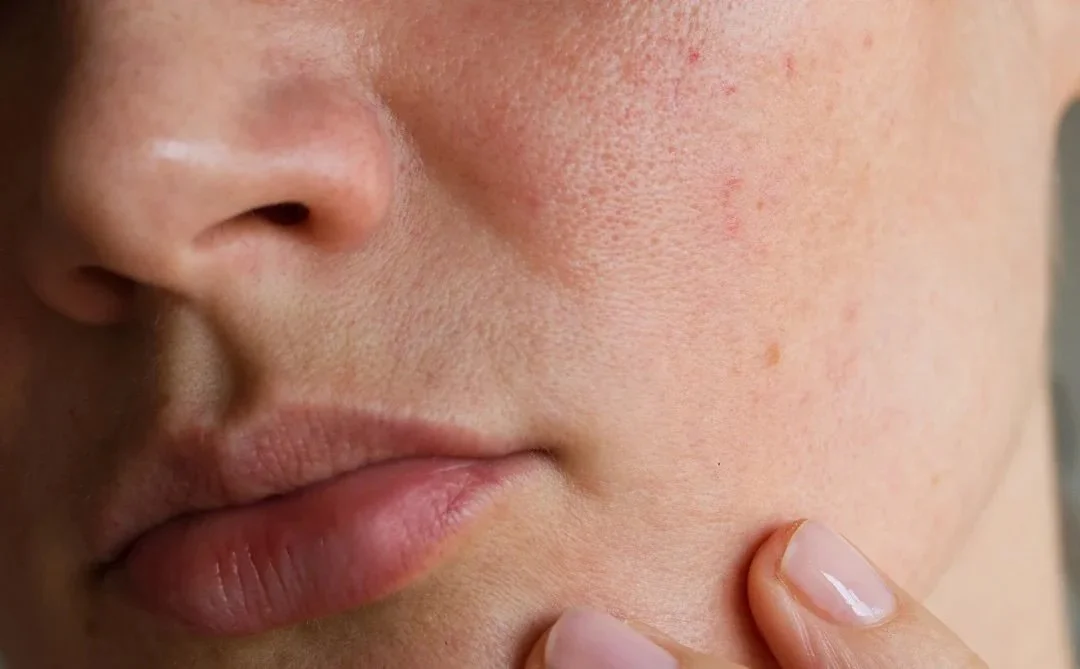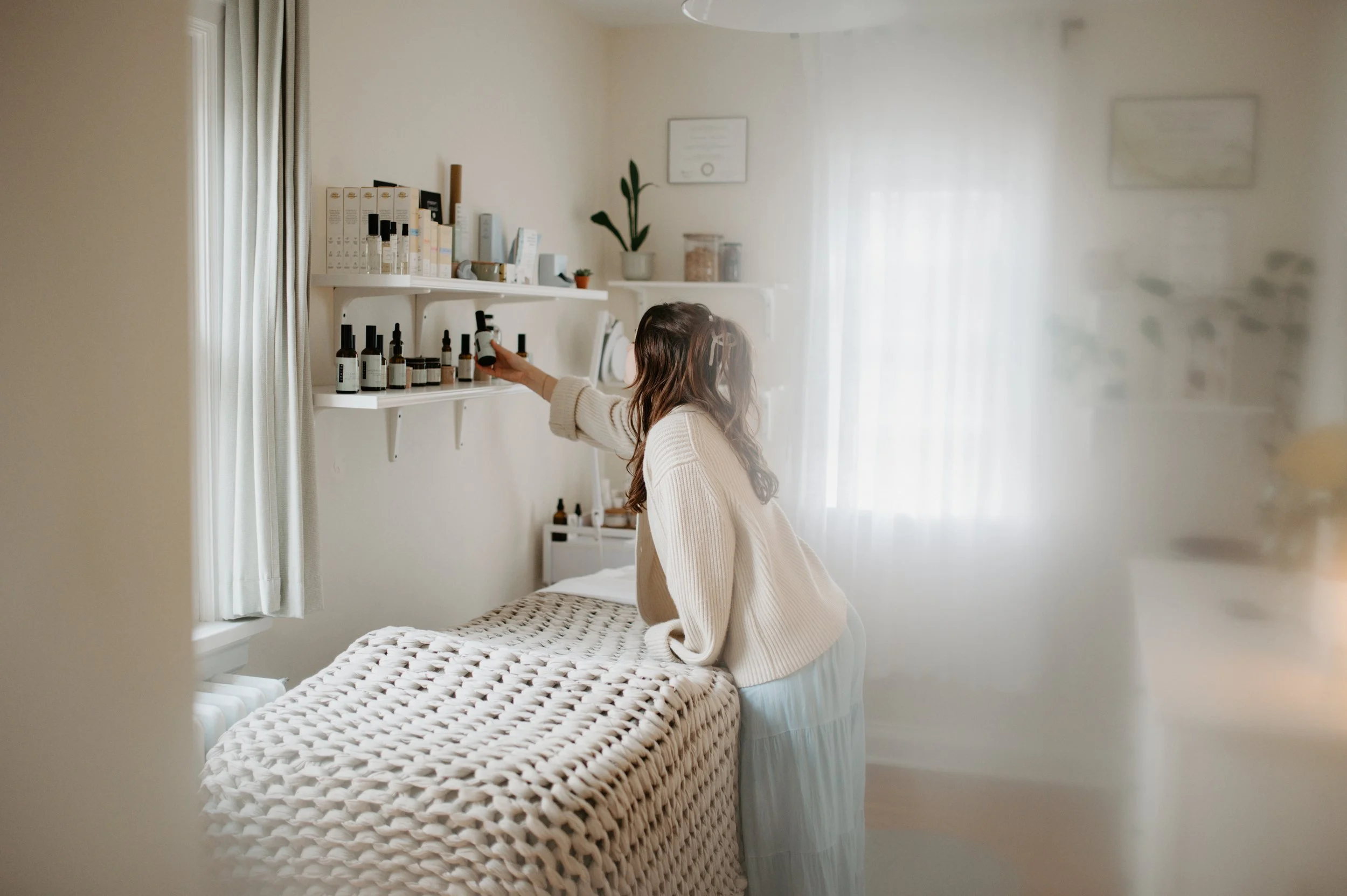a holistic skin therapist’s take on rosacea
Let’s talk rosacea! This is a skin condition I live with, although it doesn’t typically look like it. Most of my clients are surprised to hear me say that rosacea runs in my family, because my skin is typically clear, bright and radiant. This wasn’t always the case. In elementary and high school, I dealt with redness and flushing quite a bit. In my early twenties it was more prominent— likely due to the stress of living with house mates for the first time, attending post-secondary school, eating a nutrient deficient diet, lacking adequate hydration/sleep and drinking waaaaay too much alcohol.
Our genes determine whether we’re predisposed to having Rosacea— but our lifestyle choices ‘turn on’ the condition, meaning that although it lives in our DNA, we don’t necessarily have to deal with it as a daily, lifelong condition.
Some people, such as my father, do live with it their entire lives. He smoked a lot, drank coffee excessively, barely drank water, and had high stress. His rosacea got to the point where his nose was always red, bumpy, and it even enlarged the shape a bit due to the high inflammation. No matter what recommendations he was given, he would still deal with rosacea because he let it go unchecked for so long that it would be very hard to repair. The earlier we take control of the flare up, the more chance we have at reversing it completely and restoring our skin back to radiance.
If you have a rosacea flare up right now and you’re thinking to yourself, “is it possible to heal this?”—just know that it absolutely is. Trust me, I know how annoying it can be, and how much stress/anxiety can come up when dealing with a flare up (which, unfortunately, makes the condition worse). I’m here to help you understand, relax, and feel confident again. Let’s dive into what rosacea really is, what it means, and what we can do about it.
Rosacea is a long-term inflammatory skin condition that causes redness and sometimes pimples, bumps or rashes on the face, particularly the cheeks and nose. Often accompanied by flushing (temporary redness), visible blood vessels, and thickened skin. Symptoms can often come and go, with periods of flare-ups where it’s more persistent.
The root cause of rosacea is complex and involves a combination of genetic predisposition, environmental/lifestyle triggers and immune system dysfunction.
Everyone is unique and treatment varies from person to person, but what i’ve found through 10+ years working with the skin holistically is that there are common triggers among those dealing with rosacea.
Stress
Stress— whether it be physical, mental, emotional, energetic or spiritual— can bring about or exacerbate flare ups. When we have high cortisol levels, our skin is sent a message to produce more sebum (oil) which can lead to breakouts, or a shiny appearance. High cortisol also increases inflammation, which can result in redness in the skin. Anything that can lower stress is extremely helpful in healing or lowering the chances of a flare up— such as aromatherapy, meditation, breath work, a walk outside, being in nature etc. Find what brings you a sense of calm and prioritize that daily.
Diet
We are what we eat— but we’re also what we THINK about what we eat, meaning how we feel about what we’re eating plays a role in how our body responds to it. An example of this: if you feel like consuming dairy is bad for you, then you consume dairy and feel stressed about it, your body is going to have a tougher time digesting it then if you felt it would be nourishing to you. This is partly why my thoughts on diet are very nuanced, but again there are generalization that can be made which are sometimes helpful to know. Typically, avoiding spicy foods, or anything that creates a lot of heat in the body is helpful. Caffeine (particularly coffee) and alcohol (particularly red wine) are huge triggers as well. Swapping coffee for green tea is a supportive switch as the green tea provides caffeine that’s gentler and is brimming with skin-supportive antioxidants. Eating a whole-food, plant-based diet is so nourishing to the skin, feeding it with phytonutrients needed to heal, repair and revitalize our skin cells from the inside out.
Gut Health
Our skin is closely tied to our gut, so imbalances in that area can lead to disruptions on the skin. Rosacea has been reported to be associated with gastrointestinal disturbances such as SIBO, IBS, celiac, and evidence is strongly tied to inflammatory bowel disease. (PMID:33507499)
Eating probiotic and prebiotic foods is always a great way to support gut health. Lacto-fermented foods enhance gut health by introducing beneficial bacteria to the digestive system. These foods improve microbiome diversity, leading to better digestion, improved immunity and reduced inflammation. When choosing fermented foods, look for labels indicating live and active cultures, such as pickles naturally fermented in brine, not just pickled in vinegar. Examples include sauerkraut, kimchi, kefir, kombucha, yogurt, and miso.
Learn more about the difference between fermented foods and probiotics here.
Sun Protection
There’s no need to completely avoid the sun, but adequate protection is key. Especially in hot, sunny climates, the intensity of the sun’s rays can wreck havoc on rosacea. When the UV rating is 3 or more, make sure to wear SPF 30 or higher and reapply every 2 hours. Wear a wide brimmed hat and retreat to shade every once in awhile to avoid overheating. Use a calming mist or cold compress to soothe hot, inflamed skin. A general rule of thumb is if you feel the skin getting warm, get out of the sun for a short-break to recalibrate.
Skin Barrier
A healthy skin microbiome is vital in healing any sort of skin condition. Our skin barrier is our outermost organ, a layer of protection for our internal organs, and a defence mechanism against the external environment. Our skin barrier plays a crucial role in regulating hydration levels, preventing water loss and protecting against infection and inflammation. Genetic predisposition can lead to a weaker skin barrier, making it more susceptible to damage. Environmental stressors like harsh winds, low humidity and cold weather can further weaken the skin’s barrier and exacerbate sensitivity and redness.
Oftentimes, incorrect products or techniques are being used— over exfoliating, use of harsh acids, cleansing with surfactants, products with added fragrance (sometimes labelled ‘parfum’), certain essential oils, comedogenic (pore-clogging) ingredients, parabens or sulfates, rough washcloths or hot water— which disrupt the community of microorganisms living on the skin, and further rosacea symptoms, worsening overall skin health and function.
Navigating the beauty industry to pick the correct skincare routine can be daunting, overwhelming, and downright frustrating. Although everyone is unique and their skincare should be too, there are general recommendations that can be made when using gentle, effective and skin-barrier supportive skincare.
Here’s what I recommend as a daily routine for those with rosacea:
evening skincare
Use a Cleansing Oil to remove any makeup, SPF, and even if you aren’t wearing anything on the skin, there’s still excess oil production, dirt, pollution etc which we want to remove nightly before sleeping or applying any further skincare.
The best way to oil cleanse is by massaging a few pumps of oil into the face and neck for at least a minute to really break down everything sufficiently. Then remove everything with a damp washcloth. Make sure to use a fresh, clean washcloth every day, as to not spread bacteria. Learn more about Oil Cleansing here.
On freshly cleansed skin, apply a Hydrating Mist to cool, soothe and refresh the skin. Our skin is permeable when wet, so this step helps your serums and moisturizers penetrate into the skin better and work more effectively.
Using a Custom Face Serum is a great way to deliver potent phytonutrients and antioxidants to the skin, while addressing your specific skin concerns, and avoiding any potential irritating ingredients.
In warm climates or seasons, this is often enough. In cooler climates, adding a Moisturizer on top is helpful. In cold, dry climates, or in the winter season, swapping the moisturizer for a Face Balm is a great way to protect the skin from the harsh winds and dehydrating environment.
morning skincare
Rinse the skin with cool water.
Apply a mildly exfoliating and cooling Moisture Serum Gel to replenish moisture and smooth the surface of the skin.
Spritz the skin a few times with Hydrating Mist and massage Custom Face Serum into the skin while it’s damp.
Apply a tinted SPF 30 or SPF 50 moisturizer to sufficiently protect the skin from sun exposure, which can be a huge trigger.
Looking for more personalized skin support and treatment? Book a service at our organic facial studio and feel the difference barrier-supportive, bespoke botanical skincare makes!
I hope this post allows you to better understand how your skin functions and empowers you to love the skin you’re in. In my world, there’s no such thing as bad skin— it’s simply a communicative organ that sends us messages through flare ups and various conditions. The presence of rosacea is a sign that we must slow down, tune in and regain balance. When presented with a flare up, instead of freaking out and looking for another quick fix (that, as you know, doesn’t work), instead ask yourself— what in my life is seeking more attention?
Sometimes, our skincare routine is perfect, and we’re still dealing with a flare-up. If you’ve been using skin-barrier supportive skincare for awhile, the flare-up is likely not aggressive or long term, but requires internal balancing rather than external (skin). It could be related to emotional, mental, energetic or spiritual factors. Is there a person in your life causing you a lot of stress, or getting you hot and bothered? Are you burnt-out, feeling overwhelmed in your career and seeking a change but unable to make one? These types of triggers are much more individual and personal, so taking time for self-reflection is key in understanding the root-cause. Journalling is a useful tool in clarifying what may be going on mentally or emotionally. Talking to a trusted confidant can also help.
At the end of the day, you know yourself best. You are the person responsible for your own healing and you hold the power to do so. I am merely a mirror, a guide and a cheerleader. Always rooting for your radiance ✨
Does this resonate? Do you have your own rosacea story you’d like to share? Let me know in the comments below!



